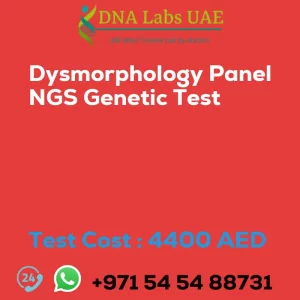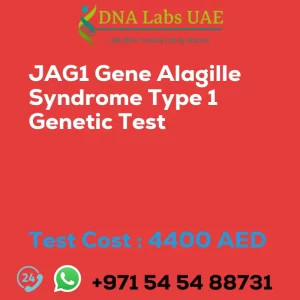CRELD1 Gene Atrioventricular Septal Defect Partial with Heterotaxy Syndrome Genetic Test
Welcome to DNA Labs UAE, a leading genetic testing laboratory in the United Arab Emirates. In this blog post, we will discuss the CRELD1 gene and its association with atrioventricular septal defect (AVSD) and heterotaxy syndrome. We will also provide details about the genetic test offered by our lab.
Test Name: CRELD1 Gene Atrioventricular Septal Defect Partial with Heterotaxy Syndrome Genetic Test
Components:
- Price: 4400.0 AED
- Sample Condition: Blood or Extracted DNA or One drop Blood on FTA Card
- Report Delivery: 3 to 4 Weeks
- Method: NGS Technology
- Test Type: Dysmorphology
- Doctor: Pediatrics
- Test Department: Genetics
Pre Test Information:
If you are considering the CRELD1 Gene Atrioventricular Septal Defect Partial with Heterotaxy Syndrome Genetic Test, we recommend providing the clinical history of the patient. Additionally, a genetic counseling session can help draw a pedigree chart of family members affected by CRELD1 Gene AVSD and heterotaxy syndrome.
Test Details:
The CRELD1 gene plays a crucial role in heart development and has been linked to certain heart defects, including atrioventricular septal defect (AVSD) and heterotaxy syndrome. AVSD is a congenital heart defect characterized by abnormalities in the septum that separates the atria and ventricles. This leads to improper blood flow between the chambers, resulting in symptoms such as difficulty breathing, poor growth, and fatigue. Heterotaxy syndrome, also known as situs ambiguus, is a condition in which the internal organs are not arranged in their usual positions. It can affect the heart, lungs, liver, and other organs and is often associated with complex heart defects like AVSD.
NGS (Next-Generation Sequencing) genetic testing is a powerful tool used to analyze multiple genes simultaneously. It utilizes advanced sequencing technology to detect genetic variations and mutations associated with various diseases and conditions, including those related to the CRELD1 gene. In the context of AVSD and heterotaxy syndrome, NGS genetic testing can help identify variations or mutations in the CRELD1 gene that may contribute to the development of these conditions.
It is important to note that genetic testing alone may not provide a definitive diagnosis or predict the severity of symptoms. Other factors, such as environmental influences and additional genetic or epigenetic factors, can also contribute to the development and presentation of these conditions. Therefore, genetic testing should be interpreted in conjunction with clinical evaluation and other diagnostic tests.
At DNA Labs UAE, we are committed to providing accurate and reliable genetic testing services. Our CRELD1 Gene Atrioventricular Septal Defect Partial with Heterotaxy Syndrome Genetic Test can offer valuable insights for diagnosis, prognosis, and potentially guiding treatment decisions. If you have any questions or would like to schedule a test, please contact our Genetics Test Department.
| Test Name | CRELD1 Gene Atrioventricular septal defect partial with heterotaxy syndrome Genetic Test |
|---|---|
| Components | |
| Price | 4400.0 AED |
| Sample Condition | Blood or Extracted DNA or One drop Blood on FTA Card |
| Report Delivery | 3 to 4 Weeks |
| Method | NGS Technology |
| Test type | Dysmorphology |
| Doctor | Pediatrics |
| Test Department: | Genetics |
| Pre Test Information | Clinical History of Patient who is going for CRELD1 Gene Atrioventricular septal defect, partial with heterotaxy syndrome NGS Genetic DNA Test. A Genetic Counselling session to draw a pedigree chart of family members affected with CRELD1 Gene Atrioventricular septal defect, partial with heterotaxy syndrome NGS Genetic DNA Test gene CRELD1 |
| Test Details |
The CRELD1 gene is associated with the development of the heart and has been implicated in certain heart defects, including atrioventricular septal defect (AVSD) and heterotaxy syndrome. AVSD is a congenital heart defect characterized by abnormalities in the septum that separates the atria and ventricles of the heart. It leads to improper blood flow between the chambers, resulting in symptoms such as difficulty breathing, poor growth, and fatigue. Heterotaxy syndrome, also known as situs ambiguus, is a condition in which the internal organs are not arranged in their usual positions. This can affect the heart, lungs, liver, and other organs. It is often associated with complex heart defects like AVSD. NGS (Next-Generation Sequencing) genetic testing is a type of genetic test that uses advanced sequencing technology to analyze multiple genes simultaneously. It allows for the detection of genetic variations and mutations that may be associated with certain diseases or conditions, including those related to the CRELD1 gene. In the context of AVSD and heterotaxy syndrome, NGS genetic testing can help identify variations or mutations in the CRELD1 gene that may be contributing to the development of these conditions. This information can be useful for diagnosis, prognosis, and potentially guiding treatment decisions. It’s important to note that genetic testing alone may not provide a definitive diagnosis or predict the severity of symptoms. Other factors, such as environmental influences and additional genetic or epigenetic factors, can also contribute to the development and presentation of these conditions. Therefore, genetic testing should be interpreted in conjunction with clinical evaluation and other diagnostic tests. |







